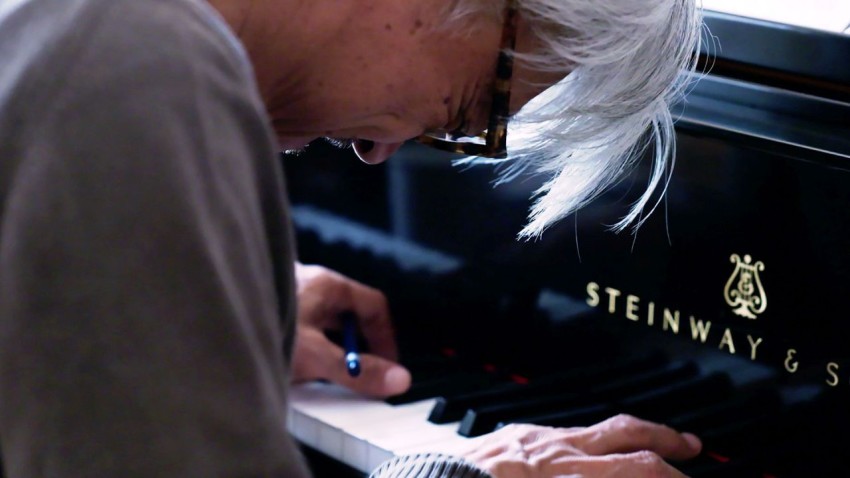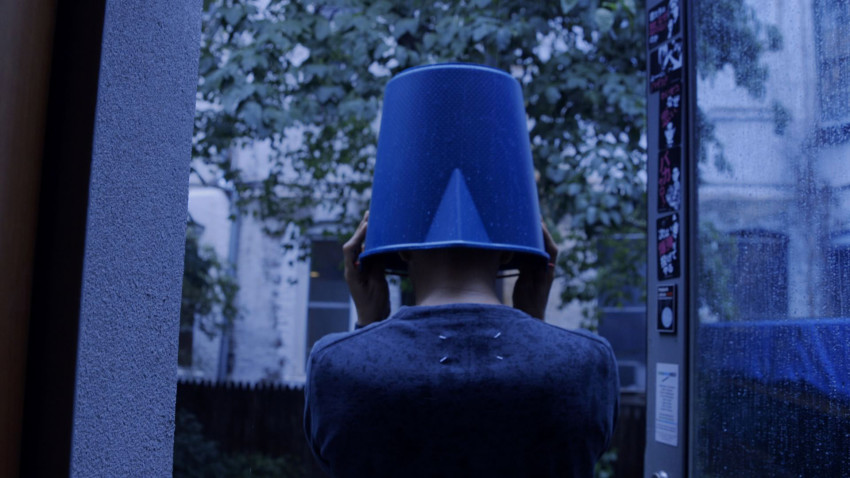Ryuichi Sakamoto: Coda
June 15, 2018 · 0 comments
by Jeremy Clarke.  Portrait of the artist at age 66. A new documentary Ryuichi Sakamoto: Coda finds musician Ryuichi Sakamoto working on a new album following a third degree throat cancer diagnosis and time off work for treatment. At the same time, it presents a select chronological appraisal of his career from Yellow Magic Orchestra and Merry Christmas Mr Lawrence up to the present day.
Portrait of the artist at age 66. A new documentary Ryuichi Sakamoto: Coda finds musician Ryuichi Sakamoto working on a new album following a third degree throat cancer diagnosis and time off work for treatment. At the same time, it presents a select chronological appraisal of his career from Yellow Magic Orchestra and Merry Christmas Mr Lawrence up to the present day.
Like Sakamoto himself, Coda starts and ends with the piano. But not just any piano. Sakamoto had heard of one that survived the 2011 Fukushima tsunami and wanted to find out for himself what it sounded like. He is shown a tidemark on a curtain “up to which the piano floated” and another tidemark on the piano itself indicating its journey. He’s impressed with its sound. He talks about how pianos are industrially constructed from planks of wood and to human ears periodically require retuning. He suggests that this process simply derives from nature trying to return the raw material from which the instrument is made to its original state.
It’s both an intimate study of an internationally renowned working musician and a condensed and highly selective overview of his career. If you include his soundtracks but not his time in Japanese, electronic trio Yellow Magic Orchestra (YMO), Sakamoto has released over 80 albums. Director Stephen Nomura Schible concentrates on a handful of familiar soundtracks, with on-set footage and anecdotes to match, the YMO material and the later, classical/avant-garde output.
A lengthy performance clip of YMO playing Tong Poo in L.A. circa 1997 accounts for most of their coverage here, while Sakamoto’s numerous non-YMO pop albums are completely ignored. Absent soundtracks include minor fare like Love is the Devil (1998) and anime Wings of Honneamise (1987), the latter still considered by this writer to be one of his most memorable scores. Instead we get The Revenant (2015) plus his three successful, international epics for producer Jeremy Thomas in the eighties: Merry Christmas, Mr Lawrence (1983), The Last Emperor (1986) and The Sheltering Sky (1992). He talks about constructing the music for The Revenant from two notes.
Merry Christmas, Mr Lawrence is particularly significant in his career. Sakamoto was hired as an actor to play a Japanese concentration camp commandant opposite David Bowie‘s British POW and, as he tells it here, being young and impetuous said “I’ll only do it if you let me write the music.” Quite apart from the sexual frisson between the two men culminating in the infamous scene where Bowie kisses Sakamoto in front of the commandant’s officers and prisoners, the other element that lodges in the viewer’s brain is the score.
The main theme remains Sakamoto’s best known and most widely recognised composition and is probably the nearest thing he has to a signature tune. It continues to function as his calling card in the movies and elsewhere. He’s performed and recorded it many times since and this documentary features a complete, recent performance of the tune in its entirety as well as archive footage of him playing it in the early eighties.
His film music commissions happened fast. For The Last Emperor he was hired as an actor then asked to contribute to the score. A clip from director Bernardo Bertolucci’s finished film shows how Sakamoto uses music to emphasise the diminishing of the Emperor as the Qing dynasty gives way to the communist Republic of China.
On Bertolucci and producer Jeremy Thomas’s next project The Sheltering Sky, the director wanted music composing at short notice just as Sakamoto was about to record in a studio with a full orchestra. “Morricone would do this,” threatened Bertolucci down the phone. Sakamoto put the orchestra session on hold for half an hour to compose the required music. In retrospect, he notes that he had no way of telling whether or not Morricone complied to such requests before deciding whether or not to do so himself.
Space is also given over to more recent classical and avant-garde works, including Sakamoto’s opera Life (1999) which deals with the environment in the wake of the atomic bomb’s development. Tantalising performance footage shows repeating sound bites from Robert Oppenheimer whose face speaks on a wall of gigantic video screens.
As might be guessed from Life’s subject matter, Sakamoto is something of an environmental activist in Japan. He wanders around the Fukushima contamination site in protective clothing and listens to eye-witnesses, speaks out against nuclear power at a rally and jumps at the chance to visit the polar ice cap where he records the sound of water running under the ice.
 In the end, sound is what motivates Sakamoto. He cites the late Russian film director Andrei Tarkovsky’s Solaris (1972) for its ambient soundscapes which incorporate the sound of running water. In his very Western-looking apartment he records rain as it falls first on a skylight then on wooden decking outside his back door. Not satisfied with the latter, he puts a plastic bucket over his head and goes outside to listen. On The Sheltering Sky he recorded author and narrator Paul Bowles’ speaking lines from his source novel. The results materialise on Sakamoto’s latest solo album Async (2017).
In the end, sound is what motivates Sakamoto. He cites the late Russian film director Andrei Tarkovsky’s Solaris (1972) for its ambient soundscapes which incorporate the sound of running water. In his very Western-looking apartment he records rain as it falls first on a skylight then on wooden decking outside his back door. Not satisfied with the latter, he puts a plastic bucket over his head and goes outside to listen. On The Sheltering Sky he recorded author and narrator Paul Bowles’ speaking lines from his source novel. The results materialise on Sakamoto’s latest solo album Async (2017).
Only well into the film, when we see footage of the composer leaving his apartment, do we realise that he’s actually living in Manhattan. We see his black and white photographs taken in the aftermath of 9/11, a brief period when all music stopped, even for someone living as enclosed and isolated an existence as Sakamoto.
The documentary ends where it began, with the piano that survived the tsunami to find its voice changed into something even more poignant. This might be a metaphor for the composer himself in the aftermath of his cancer treatment and recovery were it not for the overall strength of his wider body of work, meaning that the newer works are up to par rather than any sort of crowning achievement.
anime, Japan, Jeremy Clarke, music, Ryuichi Sakamoto, Wings Of Honneamise, Yellow Magic Orchestra
Leave a Reply